NDO - On November 18, the Institute for Policy Development (Ho Chi Minh City National University) informed about the Project "Research on the lives of teachers in the Southern region: Experiments in Tay Ninh, Binh Thuan , Hau Giang provinces". The above project was researched by the Institute, interviewing nearly 13 thousand education managers and teachers on contents related to income, life, pressure, motivation to follow the profession... The time of research was the time when the new salary policy took effect.
Income increased, but…
According to the interview results, education managers and teachers at all levels all said that: Since adjusting the basic salary from 1.8 million VND to 2.34 million VND (July 1, 2024), teachers' income has improved significantly.
However, the results of a large-scale survey (12,505 teachers) showed that the income from the teaching profession only meets an average of 51.87% of the monthly spending needs of teachers' families for the group without any additional jobs. For the group of teachers with additional jobs, it meets about 62.55%. Particularly, teachers with less than 10 years of experience assessed that "the income from the teaching profession only meets an average of 45.7% of the monthly spending needs of the family".
Some teachers, especially young teachers, said that: Although they spend very frugally, their salary runs out before the end of the month, many teachers do not dare to have a girlfriend because they cannot afford to "spend on love expenses". Many young teachers sometimes hesitate to change careers, even to work as workers in industrial zones because "the salary will be higher than that of young teachers". And in fact, in many localities, there are situations where teachers quit their jobs and switch to other jobs, including working as workers.
 |
The teachers are PhDs who won the 2024 Golden Globe Science and Technology Award, and the female students won the 2024 Female Science and Technology Award, from Ho Chi Minh City National University. |
In border, island and rural areas, the survey results were quite surprising as teachers found that their income from teaching met 62% of their family's monthly spending needs (higher than that of teachers in urban areas). This can be explained by the fact that the standard of living and spending in border and island areas is lower than in other areas, while the salary of teachers in these areas has a higher allowance.
Regarding the assessment of financial pressure (Income from teaching is not enough to cover living expenses), the average score is quite high at 3.61/5 (5 is very stressful). Of which, 44% of teachers said that they are under pressure to very stressful, while 46.45% of teachers with less than 10 years of experience are feeling pressure or very stressful in financial matters. Meanwhile, only 19% of teachers said that they are comfortable and very comfortable, not under financial pressure.
A lot of pressure, especially from parents
A rather surprising thing from the survey results shows that teachers are less pressured by their professional work (teaching or teaching time) but the biggest pressure comes from… parents of students.
The survey results show that up to 70.21% of teachers said that they were under pressure or very pressure from parents with an average score of 4.4/5 (5 points is very pressured). The survey results also show that up to 40.63% of teachers had intended to change careers due to mental violence from parents.
In-depth interviews, teachers in the school boards, subject group leaders and teachers at all levels all shared the same opinion that pressure from parents on teachers is currently an alarming issue in the education sector. Many parents have too high expectations, often deeply interfere in teaching work, and even put pressure on grades. They constantly monitor, ask questions and request detailed reports on their children's learning situation through Zalo or Facebook groups...
More worryingly, some teachers also said that some parents have seriously offended teachers (such as coming directly to school to quarrel, curse, or even assault...). Many teachers also face threats or defamation on social networks. This not only makes teachers feel tired, stressed, lose self-control and inspiration in their work, but also seriously affects the quality of education.
Overloaded, little rest time
The survey results also showed that 71.83% of teachers were overloaded with work, while the rate for preschool teachers was 87.65%. Another survey result also showed that nearly 70% of preschool teachers did not have time for physical education, sports, and recreation; while 46% of teachers at other levels spent less than 10% of their time each day on physical education, sports, and recreation. At the same time, the average time teachers spent on family care accounted for 15.81% of their time fund.
Notably, for preschool teachers, the average time spent on family care is only about 1/3 of the average, about 5.25% of the time fund. Many preschool teachers confided that they felt their job was harder than that of a bricklayer because the bricklayer also had a lunch break, while preschool teachers worked hard all day with a group of children. Meanwhile, teachers at other levels said that what they feared most was that extracurricular activities took up too much of their time.
Tutoring: need to look at it from multiple perspectives
In addition to regular teaching activities at school, there are still teachers who participate in extra teaching activities to increase their income. 25.4% of teachers surveyed teach extra classes at school and 8.2% teach extra classes outside of school. Extra teaching mainly focuses on groups of subjects such as Math, Literature, English, Physics, Chemistry (79.03%).
Teachers' extra teaching time also increased gradually according to the levels of education. On average, teachers who teach extra teaching at primary level are 8.6 hours/week, at secondary level are 13.75 hours/week and at high school level are 14.91 hours/week.
Many teachers confided that apart from a few cases of “a rotten apple spoiling the barrel” in tutoring activities, the need for extra classes is real and legitimate. Due to the disease of achievement, many weak students are still “created conditions” to move up a grade or transfer to a higher level. As a result, these students lose their foundation, cannot absorb and keep up with the knowledge they are learning in class, and feel bored with studying. In this case, parents really need to let their children take extra classes to consolidate their knowledge. In addition, a number of parents now have very high expectations for their children, so they really want their children to take extra classes, especially in preparation classes for transferring to a higher level to be able to attend good schools.
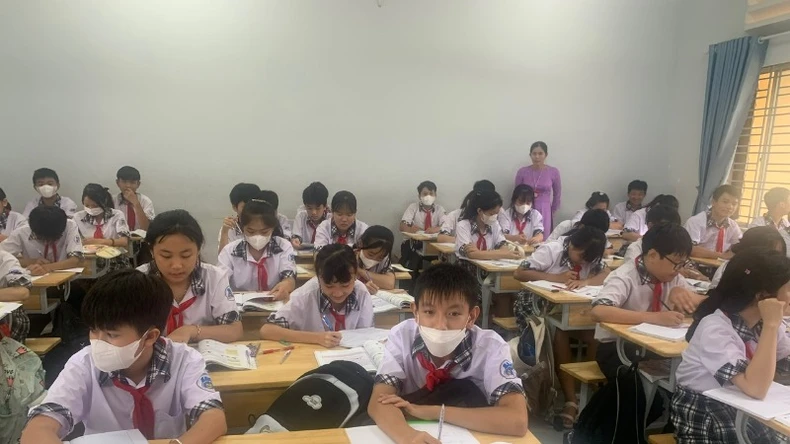 |
Teachers in rural areas have less pressure than in urban areas. |
Faced with these real needs, teachers have to teach "illegally". This, according to many teachers, seriously damages the image of teachers in the eyes of students and society, but because of the "burden of making a living", they are forced to teach "illegally".
At the same time, the results of in-depth interviews with teachers and school principals mostly said that they knew which teachers in their school taught extra classes at home or rented them elsewhere but "ignored" them, except in cases where parents reported that they were forced to teach extra classes or were sued, which they had to deal with. Therefore, up to 63.57% of teachers expressed their wish to legalize extra classes (including extra classes at home and online) to increase their income from their own abilities; at the same time, maintaining the noble image of the teaching profession in the eyes of students and society is better than doing side jobs that are less related to the profession.
According to Associate Professor, Dr. Do Phu Tran Tinh, Institute for Policy Development, the Draft Law on Teachers has determined that "the basic salary according to the teacher salary scale is ranked highest in the administrative career salary scale system" but many teachers are also concerned that the implementation of that policy will be slow in practice due to lack of resources. Besides, we need to prioritize respecting and protecting the dignity, honor, and body of teachers and continue to promote the tradition of respecting teachers in the new context. Because in the current context, when the rights of students and parents are promoted, it seems that the rights of teachers are being downgraded, especially the right to protect their dignity. And instead of strictly prohibiting extra teaching, we need to build a clear legal corridor, a transparent and public mechanism for extra teaching so that school leaders, parents and the community can participate in monitoring. At the same time, the state needs to consider issuing policies on financial incentives, as well as establishing a national financial support fund for young teachers, teachers of special subjects, talented teachers, and teachers in special areas.
Source: https://nhandan.vn/mong-thao-go-kho-khan-ap-luc-de-nang-len-doi-vai-nguoi-thay-post845570.html





![[Photo] 17th Congress of Hanoi Women's Delegates](/_next/image?url=https%3A%2F%2Fvphoto.vietnam.vn%2Fthumb%2F1200x675%2Fvietnam%2Fresource%2FIMAGE%2F2025%2F11%2F21%2F1763711953024_image-9-4623-jpg.webp&w=3840&q=75)

![[Photo] Lam Dong: Panoramic view of Lien Khuong waterfall rolling like never before](/_next/image?url=https%3A%2F%2Fvphoto.vietnam.vn%2Fthumb%2F1200x675%2Fvietnam%2Fresource%2FIMAGE%2F2025%2F11%2F20%2F1763633331783_lk7-jpg.webp&w=3840&q=75)


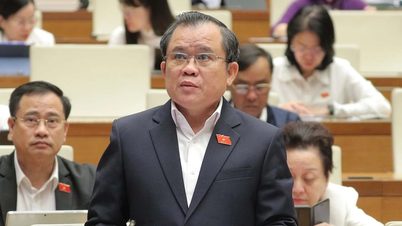















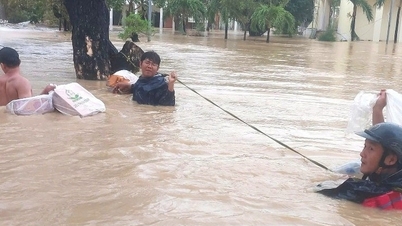








![[Photo] 17th Congress of Hanoi Women's Delegates](https://vphoto.vietnam.vn/thumb/402x226/vietnam/resource/IMAGE/2025/11/21/1763711953024_image-9-4623-jpg.webp)
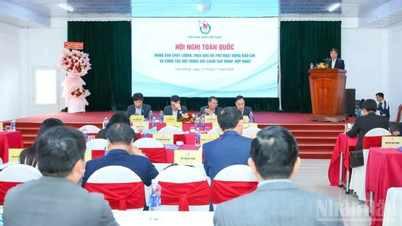



















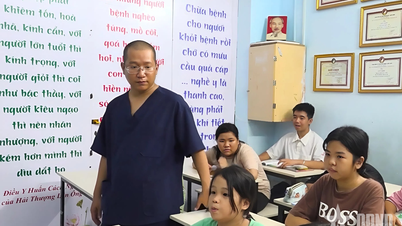































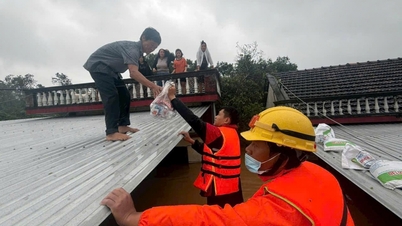





















Comment (0)